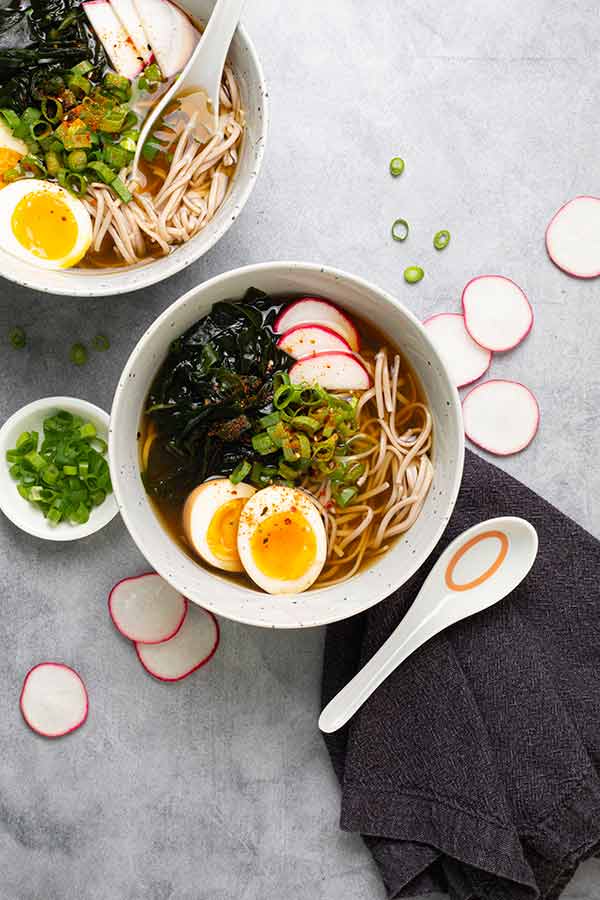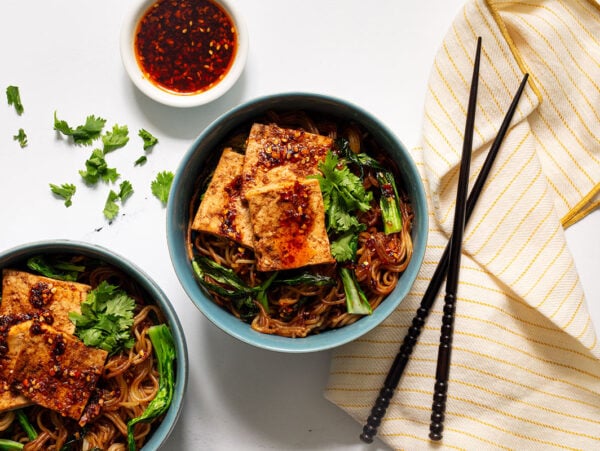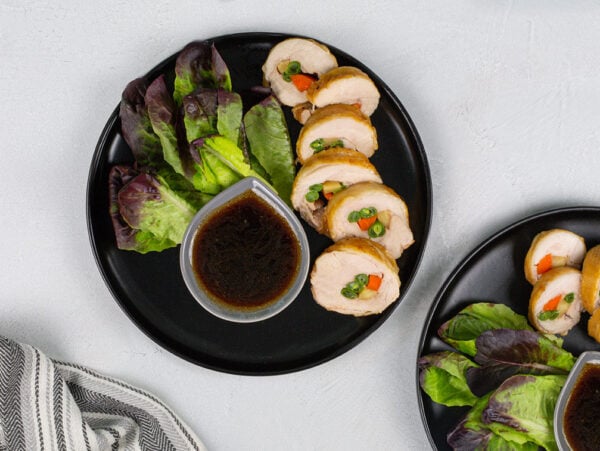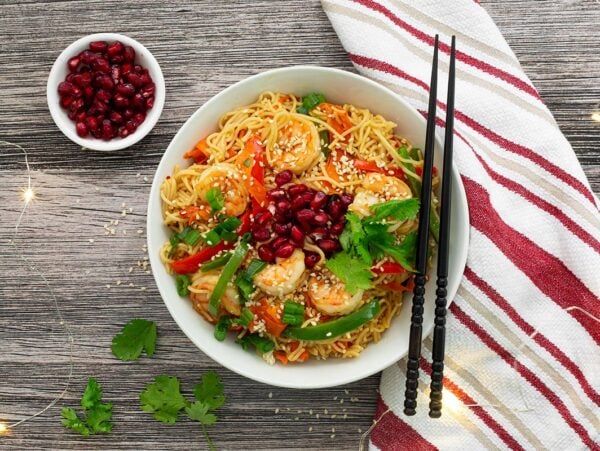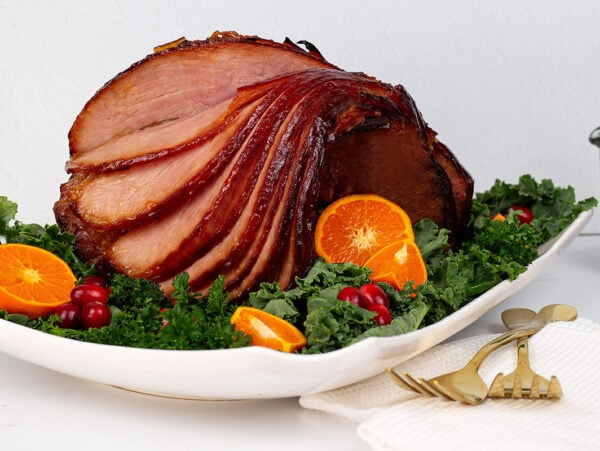Toshikoshi Soba with Yuzu Ponzu Pickled Eggs
Published Dec 27, 2024
This post contains affiliate links. Please see our disclosure policy.
The Significance of Toshikoshi Soba on New Year’s Eve
As the year comes to a close, many in Japan observe a tradition steeped in centuries of cultural meaning: eating Toshikoshi Soba, or “year-crossing noodles.” This simple yet symbolic dish is more than a meal—it’s a meaningful way to usher in the new year with hope, resilience, and renewal.
The History of Toshikoshi Soba
Toshikoshi Soba dates back to the Kamakura period (1185–1333), when Japanese temples began offering buckwheat noodles to locals. Over time, the practice became associated with New Year’s Eve as a way to metaphorically “cut off” the hardships of the previous year. The dish represents starting afresh, carrying with it cultural and spiritual weight that resonates with generations.
Symbolism Behind the Noodles
The long, slender shape of soba noodles symbolizes longevity and good fortune, while their ease of cutting reflects the idea of severing ties with misfortune. Eating soba is believed to grant both physical and spiritual endurance for the year ahead, a comforting thought as you reflect on the past and look toward the future.
Enhancing Tradition with Yuzu Ponzu Pickled Eggs
In the recipe provided, Toshikoshi Soba is elevated with Yuzu Ponzu Pickled Eggs made using Marukan Yuzu Ponzu. The eggs, tangy and fragrant from the ponzu marinade, offer a bright contrast to the umami-rich dashi broth and earthy buckwheat noodles. Their vibrant appearance also brings a festive touch to the dish.
These pickled eggs are a versatile addition beyond this recipe. Here are some other ways to enjoy them:
- As a topping for rice bowls or ramen: Their zesty yuzu flavor pairs beautifully with savory dishes.
- Sliced into salads: Add protein and a citrusy punch to greens or grain bowls.
- On their own as a snack: The balance of savory and tangy makes them a perfect midday pick-me-up.
- In bento boxes: These eggs are portable and visually appealing for packed lunches.
A Dish for Reflection and Renewal
As you prepare your own bowl of Toshikoshi Soba, let the rich flavors and symbolism remind you of the journey behind and the opportunities ahead. Whether you follow this tradition every year or are discovering it for the first time, incorporating personal touches—like pickled eggs infused with the bright notes of yuzu—helps make the ritual your own.
So this New Year’s Eve, gather your loved ones, share a meal, and let the tradition of Toshikoshi Soba bring connection, hope, and good fortune to your table.
Here’s wishing you and yours a very happy and prosperous 2025!
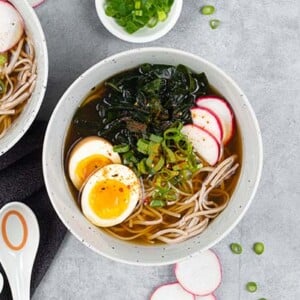
Toshikoshi Soba with Yuzu Ponzu Pickled Eggs
Ingredients
- 1 (8-ounce package buckwheat soba noodles)
- 2 tablespoons dried wakame seaweed
- 3 cups water
- 1 piece (4-5 inches) kombu (dried kelp), soaked overnight
- 1 cup dried bonito flakes
- 2 tablespoons Marukan Seasoned Rice Vinegar
- 2 tablespoons gluten-free tamari
- 2 Yuzu Ponzu Pickled Eggs, (recipe follows), halved
- 2-3 radishes, , sliced
- 1 green onion, , sliced
- Schichimi togarashi, (Japanese spice mix), optional – for spice
Instructions
- Bring a large pot of unsalted water to a boil and cook the soba noodles per the package directions. Drain and rinse in cold water. Set aside.
- Place the dried wakame in a bowl and cover with water, let sit for 10 minutes. Drain and squeeze dry.
- Put 3 cups water and the soaked kombu in a medium saucepan and bring to a boil over medium-low heat. Once it boils remove the kombu and add the bonito flakes. Let simmer for 1 minute. Remove from the heat and let steep for 15 minutes. Drain and discard the bonito flakes from the dashi broth and put broth back in the saucepan with the Marukan Seasoned Rice Vinegar and tamari and bring to a boil.
- Divide the soba noodles between two bowls, pour over the hot dashi broth, top with the rehydrated wakame seaweed, Yuzu Ponzu Pickled Eggs, sliced radishes, green onion, and schichimi togarashi, if desired.
Nutrition
Nutrition information is automatically calculated, so should only be used as an approximation.

Yuzu Ponzu Pickled Eggs
Instructions
- Fill a small saucepan with water and bring to a boil. Place an ice bath next to the stove. When the water is boiling, gently add the eggs into the water and cook for 6½ minutes. Transfer to the ice bath. Peel eggs, place in a small bowl and cover with Marukan Yuzu Ponzu. Make sure the eggs are submerged. Marinate in the refrigerator for 2-6 hours.
Nutrition
Nutrition information is automatically calculated, so should only be used as an approximation.


